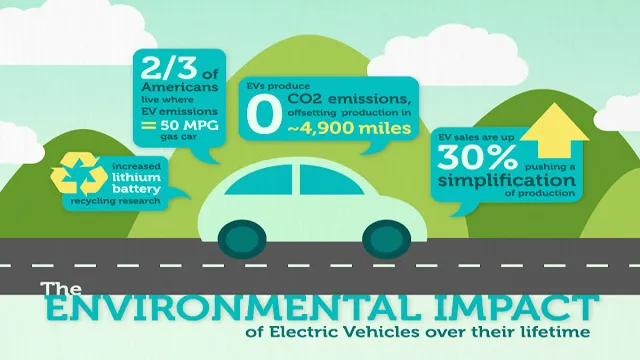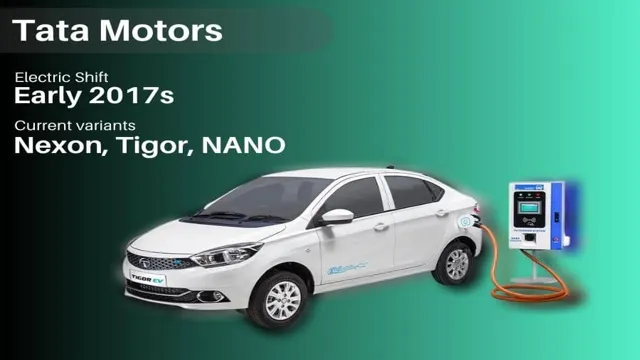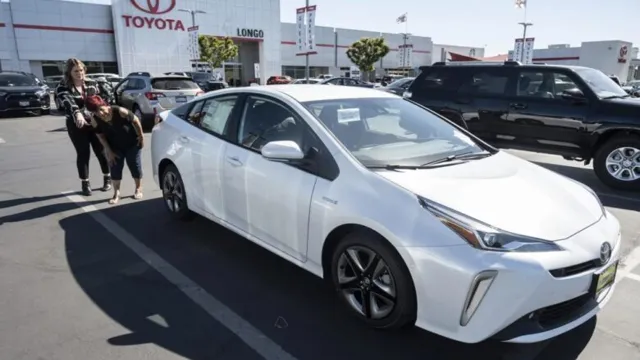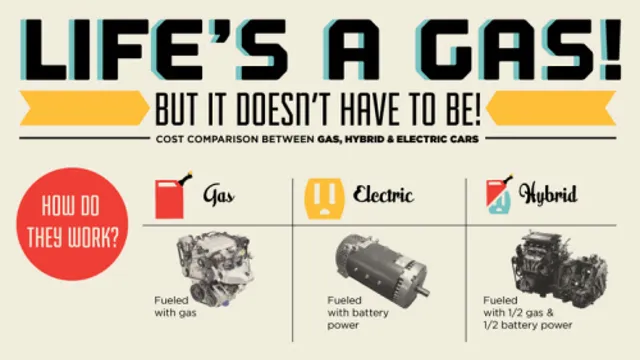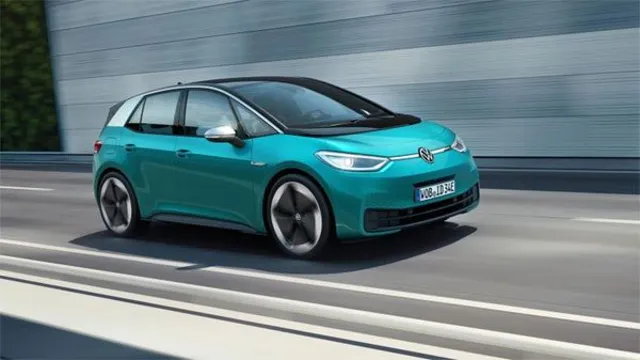Green Wheels on the Road: How Electric Cars are Advancing a Sustainable Environment
Electric cars are becoming increasingly popular in recent years, largely due to their benefits for the environment. With climate change becoming more of an urgent issue, many individuals are looking for ways to reduce their carbon footprint and do their part in protecting the planet. Electric cars offer a solution that not only reduces greenhouse gas emissions but also improves air quality and lessens our dependence on fossil fuels.
In this blog post, we will dive deeper into the ways in which electric cars benefit the environment and how they can help us move towards a more sustainable future.
Lower Greenhouse Gas Emissions
One of the biggest advantages of electric cars is their contribution to lower greenhouse gas emissions, which is a tremendous benefit to the environment. Greenhouse gases like carbon dioxide, methane, and nitrous oxide are released into the atmosphere when we burn fossil fuels like gasoline and diesel. Through a process called electrification, electric cars use energy stored in their batteries to power their motors, which means they don’t emit any pollutants or greenhouse gases.
Electric cars can help reduce our carbon footprint, which is essential in the fight against global warming. Additionally, this shift towards electric cars can help reduce our dependency on fossil fuels, which will ultimately lead to an even more sustainable future.
Electric Cars Produce Significantly Less CO2 than Gas-Powered Cars
Electric cars have been hailed as a greener alternative to gasoline-powered cars, and for good reason. They produce significantly less CO2 emissions compared to their fossil fuel counterparts. In fact, research shows that even when you take into account the manufacturing and electricity generation that goes into charging electric cars, their total emissions are still much lower than those of petrol and diesel cars.
This is because electricity from the grid is becoming cleaner and greener, with an increasing share coming from renewable sources such as wind and solar power. When you drive an electric car, you are effectively driving on the cleanest type of energy available, which helps to reduce your carbon footprint and contributes towards a more sustainable future. So, if you’re looking to make a positive impact on the environment, switching to an electric car could be a great place to start.
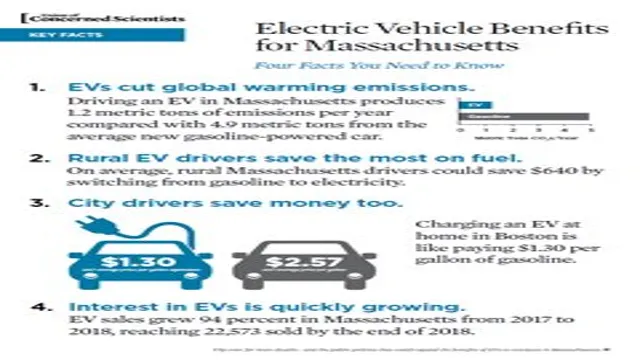
Electric Cars Can Use Renewable Energy Sources
One of the most significant benefits of electric cars is that they can use renewable energy sources, which contributes to lower greenhouse gas emissions. For instance, if you charge your electric car from solar panels or wind turbines, you are reducing your carbon footprint. When compared to gasoline-powered vehicles, electric cars produce less harmful emissions like carbon monoxide, nitrogen oxides, and particulate matter, which are responsible for air pollution.
In addition, renewable energy sources are sustainable and eco-friendly, making them an ideal choice for powering cars. By harnessing the power of renewable energy, electric cars can drive us towards a cleaner and greener future.
Reduced Air Pollution
When we talk about the benefits of electric cars, one of the most significant advantages is their contribution to reducing air pollution. By running on electricity rather than gasoline, electric cars produce zero emissions of harmful pollutants such as carbon monoxide, nitrogen oxides, and particulate matter. This means that in areas with high levels of air pollution, electric vehicles can make a real difference in improving air quality.
Moreover, while traditional cars emit greenhouse gases that contribute to climate change, electric cars produce far fewer emissions, making them an essential tool in the fight against global warming. In short, the shift to electric cars can lead to a cleaner, healthier, and more sustainable environment, making it an excellent investment for the future. So let’s take a step forward towards a greener, cleaner world and embrace the use of electric vehicles as a primary means of transport.
Electric Cars Have Zero Tailpipe Emissions
Electric cars offer numerous environmental benefits, one of the biggest being their ability to produce zero tailpipe emissions. This has a significant impact on air pollution since traditional gasoline cars emit harmful pollutants like carbon dioxide, hydrocarbons, and nitrogen oxides that can damage our environment and affect human health. By switching to electric cars, we can reduce the number of pollutants being released into the air and help create a cleaner, safer world.
Not only that, but electric cars can even be powered by renewable energy sources like wind or solar power, making them even more eco-friendly. So, if you’re looking for a way to reduce your carbon footprint and help protect the planet, consider making the switch to an electric car today!
Reduced Emissions Improve Air Quality in Cities
Reduced air pollution Cities all over the world are benefiting from reduced air pollution as a result of efforts to lower greenhouse gas emissions. With fewer cars on the road, less industrial activity, and a general slowdown in human activity during the COVID-19 pandemic, the skies in many urban centers have become clearer, with a significant decline in airborne particulates. This has, in turn, led to improved air quality and better health outcomes for residents.
For cities that have long struggled with high levels of pollution, this has been a welcome development, with many reporting lower rates of asthma and other respiratory illnesses. While there is still much work to be done in order to achieve sustainable, low-emission cities in the long term, the current situation underscores the importance of taking action to reduce pollution and protect public health.
Electric Cars Don’t Produce Harmful Nitrogen Oxide or Sulfur Oxide
Electric cars have been making a splash in the automotive industry for their eco-friendliness, and one of the key benefits is the reduction of harmful pollutants. Traditional internal combustion engines release nitrogen oxide and sulfur oxide into the air, contributing to air pollution and health issues. Electric cars, on the other hand, run on electricity and produce zero emissions exhaust.
This means that they don’t release any harmful pollutants into the air, such as nitrogen oxide or sulfur oxide, resulting in cleaner air for everyone to breathe. It’s like the difference between a smoker lighting up in a crowded room versus someone quietly reading a book. In addition to reducing pollution, electric cars are also quieter and smoother to drive, making for a better overall experience.
Decreased Dependence on Fossil Fuels
Electric cars benefit the environment in many ways, one being the decreased dependence on fossil fuels. The burning of fossil fuels, such as gasoline, releases harmful pollutants into the atmosphere, contributing to climate change and poor air quality. Electric cars, on the other hand, run on electric power instead of gasoline, reducing the amount of harmful emissions released into the air.
By driving an electric car, you can help decrease our reliance on fossil fuels, ultimately leading to a cleaner and healthier planet. Plus, with advancements in renewable energy sources like solar power, we have even more opportunities to power our electric cars with clean and sustainable energy. So not only are electric cars better for the environment, but they also pave the way for a more sustainable future.
Electric Cars Use Less Oil and Gasoline
The move towards electric cars is not just a trend; it is challenging the traditional dependence on fossil fuels. By opting for an electric vehicle, you are reducing your reliance on oil and gasoline. The shift to electric cars means that we can look forward to a future with cleaner air and a less polluted environment.
It eliminates the need to worry about fluctuating oil prices and foreign oil dependence. Electric cars are sustainable and renewable, and they provide significant cost savings in the long term. It is like switching from a conventional showerhead to a low-flow one; it reduces your water usage while still providing the same benefit.
Electric cars are the future of mobility and a vital step towards reducing our carbon footprint.
Electric Cars Enable Energy Independence and Security
Electric cars are a game-changer when it comes to energy independence and security. One major advantage of electric cars is their decreased dependence on fossil fuels. Unlike traditional cars that rely on gasoline, electric cars operate on electricity that can come from a variety of sources.
This means that countries and communities can reduce their reliance on costly and finite fossil fuels, which often require imported oil and gas. This shift towards renewable energy sources also helps to improve energy security and reduce geopolitical tensions that can arise from oil price volatility. With electric cars, individuals can power their vehicles from home solar panels, wind turbines, or other clean energy sources.
By investing in electric cars and renewable energy, we can move towards a more sustainable future—one that relies less on non-renewable resources and is more independent and secure.
Possible Drawbacks to Be Considered
While electric cars seem to be the answer to the world’s pollution problems, there are still some potential drawbacks to consider. Environmental benefits are for sure one of the primary advantages of driving electric vehicles. However, the production of electric cars can emit a significant amount of carbon and other harmful gases into the atmosphere.
Moreover, their batteries require several minerals such as lithium and cobalt, which need to be mined, processed, and transported. This process can also have significant environmental impacts, including deforestation, habitat loss, and pollution of nearby waterways. Additionally, the disposal of old batteries must be appropriately handled as they contain toxic chemicals and heavy metals that can be hazardous if not disposed of correctly.
Therefore, while electric cars provide an excellent solution to reducing pollution, one must consider the entire supply chain and the full life cycle of the vehicle.
Conclusion
In conclusion, electric cars are the shining beacons of hope for our planet. With their zero emissions and highly efficient performance, they offer a sweet escape from the harmful effects of traditional cars on our environment. With electric cars, we can drive our way to a cleaner and greener future, giving Mother Earth the much-needed rest and respite she deserves.
It’s time to switch to electric cars and join in the global effort to save our planet. After all, who doesn’t want to cruise through life with a clear conscience and a cleaner atmosphere? Let’s go green, one charge at a time!”
FAQs
How do electric cars benefit the environment?
Electric cars produce zero emissions, reducing harmful pollutants in the air and helping to combat climate change.
Are electric cars more energy-efficient than gasoline cars?
Yes, electric cars convert a higher percentage of stored energy into power to move the vehicle, whereas gasoline cars lose energy through heat and other inefficiencies.
Does owning an electric car save money in the long run?
Yes, electric cars have lower operating costs than gasoline cars due to cheaper electricity and fewer maintenance requirements.
Can electric cars help reduce dependence on foreign oil?
Yes, electric cars can help reduce the need for imported oil, ultimately making the country more energy independent and secure.

